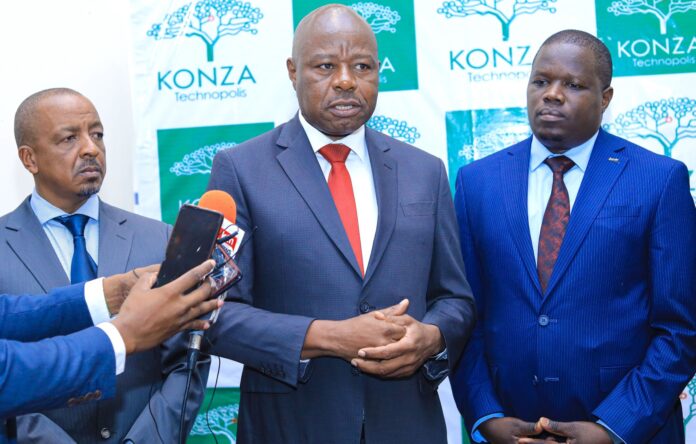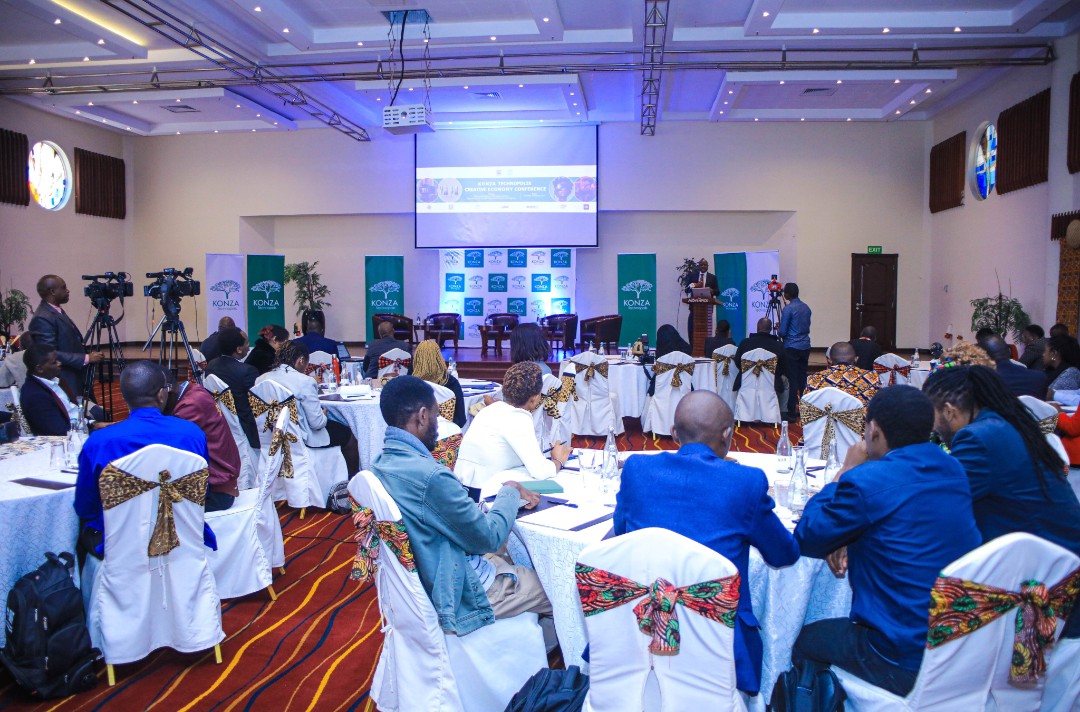
By Juliet Akoth
Nairobi, Kenya: The inaugural Creative Economy Conference by Konza Technopolis took place on Tuesday at a Nairobi hotel. The conference brought together policymakers, industry stakeholders, and banking professionals to explore the immense potential of the creative sector.
With the theme of the conference being the Creative Sector in the Digital Economy, panelists, and other speakers emphasized the urgent need to focus more efforts in bolstering the creative sector which could create millions of jobs for many Kenyans.
Speaking during the event, the Principal Secretary for Broadcasting and Telecommunications, Prof. Edward Kisiang’ani, noted that the government is working to streamline the creative sector for favorable tax regimes and financing policies.
The PS disclosed that the government will spend KES 15.1 billion (USD 15Million) in developing the digital superhighway in a bid to position Kenya as a unique creative economy hub destination. Adding that they are seeking financial support from the private sector to further develop the creative as the private sector seeks to leverage government facilities such as the digital superhighway and the Konza Technopolis Data Centre.

“The government is ready to support the creative economy so that it can create more jobs at an individual and institutional level. This sector presents a positive opportunity for more job opportunities for Kenyans because we don’t have the capacity in government to give everybody a job.”
The Kenyan government has already embarked on campaign programs to educate the general public but especially young people on digital literacy. 25, 000 hotspot areas are to be set up countrywide to help people access the Internet and know what’s happening in other parts of the world. This will in turn enable them to acquire digital skills and know how to use them creatively to make money.
Furthermore, the PS took note of the importance of legislation on intellectual property and the taxation issue. “At the moment, we are looking at the tax regimes with a view to optimize and streamlined. We would like the creative to be promoted and bot to be punished by some of these tax regimes. We are also looking at the legal issues to ensure checks and balances in the sector to avoid infringement on privacy while advancing the creative economy,
The government is also looking at the possibility of giving upcoming creatives more support such as data storage and financial support from private partners.
On his end, John Paul Okwiri, Ag. CEO Konza Technopolis Development Authority (KoTDA) stressed that they are supporting creative startups at the National Tier III data center with one-year free hosting in view of building a sustainable media city project.
“You will realise that the youth are asking for opportunities. With our state of the art data center, we are providing an opportunity for the youth in a creative economy with storage. For all the startups, we are providing one year of hosting and that’s why we are convening this conference so that we can showcase the opportunities.”
KoTDA is in the process of developing the Digital Media City which will focus on developing a media hub at Konza Technopolis. The Konza Digital Media City is envisioned to provide an ecosystem that promotes training, research, and innovation in the digital media and entertainment industries in Kenya and the African region.
Founder and CEO of Art at Work Limited Roy Gitahi during his speech underscored the need to strengthen the partnerships and collaborations in the creative sector for more opportunities.
“What we found at Konza (National data center) is something the private sector cannot buildeasily. But is it important because all this content can be placed at the center and we can explore avenues of monetizing the data? This is something that the private and public sectors must partner to drive,” he said.
However, it also became clear that some creatives are faced with multiple challenges in navigating this sector. The challenges include the informality of their businesses, lack of adequate business skills, and fluctuating cash flows.
Some recommendations were proposed to deal with the aforementioned challenges and they are a formalization of businesses through registration, utilizing digital platforms for e-commerce & e-payment, enhancing copyright registration & providing business skills training.
Other suggested recommendations are the provision of support through credit guarantee schemes & the removal of certain taxes and fees, and market interventions such as improving copyright management, intellectual property regulations, and digital distribution channels.
The conference was also attended by Timothy Owase, CEO, of Kenya Film Commission, Joel Omalwa, Ag. CEO, Kenya Film Classification Board, Ezekiel Mutua the CEO of Music Copyright Society Kenya and Wesley Maritim, Director of Administration, State Department of ICT.













